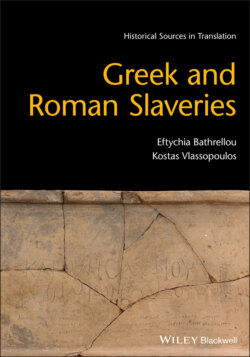Читать книгу Greek and Roman Slaveries - Eftychia Bathrellou - Страница 20
1.9 Aristotle, Politics, 1264a17–22: Greek Philosophical Treatise (Fourth Century BCE)
ОглавлениеAristotle draws attention to the vagueness of Plato’s Republic about whether the ideal of communal property would apply to all the classes in the ideal city or to the guardians only.
Literature: Lewis 2018: 147–65.
If everything is common to all in the same way as among the guardians, then in what way will the farmers be different from the guardians? Or what benefit will there be to those who submit themselves to their rule? Or on what consideration will they submit themselves to the guardians’ rule unless the guardians think of a clever idea similar to that of the Cretans? For the Cretans have allowed to their slaves everything they allow to themselves, with only two exceptions: they forbid them to use the gymnasia and possess weapons.
What activities are prohibited to Cretan slaves? Why?
Does this necessarily mean that Cretan slaves were better treated than Spartan helots?
Does the description “between slave and free” (see 1.3) fit Cretan slaves better than helots?
